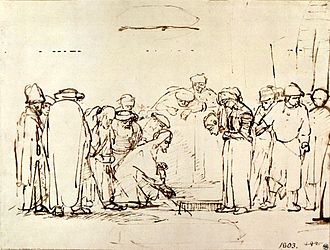Blog roll
Blog Posts
Encounters with Scripture, Christ, and daily life by Michael Bromley
Blog:"Get behind me, Satan!"[edit | edit source]

by Michael, Nov 15, 2024
I love this line from Scripture -- and it's rather useful at times, a magnificent rebuke, "Get behind me, Satan!" My wife and I throw that one at each other when we're getting on our nerves, or just for fun.
We don't know how Peter reacted to it, as it was in no way said in jest. Think about it: the Lord called him "Satan" (and as a proper noun) !
What's going on here?
"none greater than John the Baptist"[edit | edit source]

by Michael, Oct 11, 2024
John 1:6-7 tells it straight:
A man named John was sent from God. He came for testimony, to testify to the light [Christ]
This was most confusing to the pharisees, who, John tells us, couldn't get their heads around the idea that John was baptizing people, yet denied that he was the Messiah.[1]
Yet, we ourselves, it seems, are mystified by John the Baptist, as well.
Visions of Modernism Part 2: How'd we get here?[edit | edit source]

by Michael, Sep 21, 2024
As discussed in the [prior] post, the difference between the sinful state of 1917 and today is one of scale not kind, with that scale created by the levers of technology that today dispenses "scandal" with neither limits nor cessation. Bombs are now nuclear. Pornography is now virtual.
While of a kind, albeit on a vast scale, we have also changed the degree of sin. Contraception makes even conjugial sex sinful. Pornography entices, then numbs its viewers to the despicable and cruel. Advertising leverages our concupiscence, targeting even "the little ones." We carry instruments of sin in our pockets, and our educators, politicians, and professionals are "scandalous" not from the public outrage they may or ought to cause, as the modern world defines it, but from the sin they lead others to.
Salvation is for the "childlike"? Matthew 11:25[edit | edit source]

Aug 1, 2024 by Michael
From the Book of Matthew, Chapter 11:25:
At that time Jesus said in reply, “I give praise to you, Father, Lord of heaven and earth, for although you have hidden these things from the wise and the learned you have revealed them to the childlike."
While teaching at a Catholic high school, a colleague tried to convert me. Of a protestant background, but not even baptized, I was one of those enlightened moderns who felt good about God and Jesus but not so much as to be troubled by belief, and certainly not at the expense of "reason." My colleague's argument was that I was over-intellectualizing faith: instead, I should approach God “like a child,” you know, "childlike."
"and greet no one along the way"[edit | edit source]

June 3, 2024 by Michael
From the Book of Luke, Chapter 10:
The Mission of the Seventy-two.
Go on your way; behold, I am sending you like lambs among wolves. Carry no money bag, no sack, no sandals; and greet no one along the way. Into whatever house you enter, first say, ‘Peace to this household.’ If a peaceful person lives there, your peace will rest on him; but if not, it will return to you.
At our Arlington (Virginia) Diocese Ordination Mass, June 1, 2024, Bishop Burbidge advised the new Priests to follow the Lord's instructions to the Seventy-Two (disciples) to "carry no" things, which is appropriate for the mission of a new priest: your job must not be burdened by the world, so leave it behind.
Visions of Modernism Part 1: Fátima & sins of the flesh[edit | edit source]

May 22, 2024 by Michael
As I start to write this a few days past the May 13 anniversary, and considering the world about us, one can hardly think that Our Lady of Fatima's 1917 warnings of the Father's wrath expired with two world wars and the fall of Soviet communism. Likewise, it is difficult to imagine that God is any less offended by our sins today than in 1919, when Our Lady told the young Jacinta that "sins of the flesh" were condemning more souls to perdition than any other form of sin.
While we have progressed materially since then, I am hard put to think of more than a single way we have advanced spiritually, and that can only be through the purifiying effect of our general depridation upon a faithful core.
Recieving (not taking) Communion[edit | edit source]

May 13, 2024 by Michael
Even from Catholics, one may hear the Rite of Communion referred to -- incorrectly -- as "taking Communion."
"Taking" Communion -?
It seems that "taking" Communion is more commonly used by Protestants, and, if so, perhaps it represents a doctrinal diistinction regarding the Holy Eucharist. This website is uninterested in Catholic v. Protestant apologetic debates, so we will not go into the Protestant choice of words here, and, instead, focus on Catholic teaching of the Sacrament of the Eucharist and why one "recieves" and does not "take" Holy Communion.
A possible source of the confusion may stem from the use of "partake" by St. Paul in 1 Corinthians 17:
Because the loaf of bread is one, we, though many, are one body, for we all partake of the one loaf (1 Cor 10:16-17)
Separation from God: free will, sin and willful damnation[edit | edit source]

May 6, 2024 by Michael
Then Jesus straightened up and said to her, “Woman, where are they? Has no one condemned you?” She replied, “No one, sir.” Then Jesus said, “Neither do I condemn you. Go, from now on do not sin any more.” (Jn 8:11)
As across Salvation History, here we have the blessing and the correction -- called a "curse" in the Old Testament:
"Go, from now on do not sin any more."
There has been much wonder and academic debate over this passage. Some scholars say it was added to the Gospel of John well after its writing, and is thus inauthentic. Others say it was in the original manuscripts but dropped for a time for fear that the passage legimized adultery.
"(and you yourself a sword will pierce)": an Easter reflection[edit | edit source]

April 1, 2024 by Michael
At The Presentation in the Temple (Lk 2:34-36), the Evangelist tells us of Simeon's blessing of Mary and Joseph:
and Simeon blessed them and said to Mary his mother, “Behold, this child is destined for the fall and rise of many in Israel, and to be a sign that will be contradicted
(and you yourself a sword will pierce)
so that the thoughts of many hearts may be revealed.”
God speaks to us, St. Paul instructs us, "through his prophets in the holy scriptures" (Rm 1:2), but not always so plainly as Simeon to Mary:
(and you yourself a sword will pierce)
Why are there no eulogies in a Catholic Funeral Mass?[edit | edit source]

March 12, 2024 by Michael
The purpose of the Liturgy & lay participation at Mass: Liturgical celebrations are, by definition, public ceremonies (see Glossary: Liturgy). But they are not for the public. In liturgical celebrations, the faithful come together to celebrate, praise, and glorify God. When we interject ourselves into the Mass, we make it about us, not God. I love a good Homily, and enjoy a particularly beautiful choir, but those liturgical elements elevate and do not replace the purpose of the Mass.
